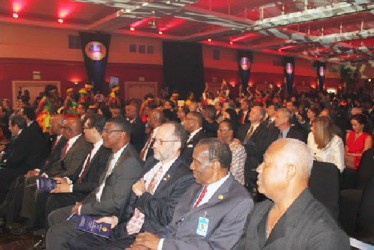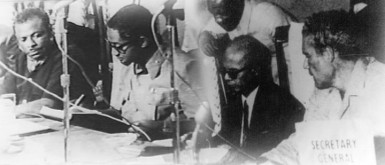Secretary-General of the Caribbean Community (Caricom) Ambassador Irwin LaRocque asserts that Caricom youth have said that they want a Caribbean Community in their future and want to push the boundaries beyond where they are.
LaRoque was speaking at the opening of the Thirty-Fourth meeting of the conference of Heads of Government of Caricom in Port of Spain, Trinidad and Tobago on Wednesday.
In remarks released by the Caricom Secretariat, as Caricom marks its 40th anniversary,

LaRoque told the Heads that the youth do not foresee a future without Caricom. He said that their vision was of a community in which they could move freely, interacting and seeking opportunities; a community in which they had a role in the decision-making process; a community in which there would be no need for them to migrate to earn a decent livelihood. They also recognised their role in promoting integration and pledged to be torch bearers in their countries.
“For those who question the relevance of Caricom, I say: where would we be as a people; where would our youth be, if there were no Caribbean Community? A group of disparate countries each seeking to make its own way in a world incredibly hostile to small and micro states. Integration of the Caribbean Community is no esoteric ideal but a hard headed reality. The same reality that drove the founding fathers to sign that Treaty forty years ago continues to impel us,” he declared.
LaRoque said, “As we celebrate 40 Years of Integration under the theme, Celebration and Renewal, it is clear … that we have a lot to celebrate as substantial progress has been made in our integration movement. However, we are also certain that more could have been done and we are all aware of the shortcomings that we must address. In full recognition of this, the Community is involved in a reform process to ensure that our arrangements are relevant and can deliver even more tangible benefits going forward. Within the context of an ever evolving world, it is mandatory that we reflect on our course to keep ahead of the game. Yesterday’s solutions may not always resolve today’s challenges.”
According to LaRoque, this reform process encompassed every facet of the operations including the manner in which they conduct their affairs at every level and a review of all the institutions. He said that the review of the Caricom Secretariat was underway and the change facilitation team has been working at the Secretariat under his direction. A key element of this process was a five-year strategic plan for the Community, the first in its existence.

“Relevance, efficiency, effectiveness, flexibility, responsiveness, innovation and creativity, all aimed at providing improved service to our people, is the goal of this reform process. The people centred approach to development is the driver of the change that we are striving to provide. It is at the heart of our integration arrangements and our agenda item at this meeting on treatment of persons with disabilities demonstrates our continued concern at the highest level for the welfare of our citizens,” he stated.
He highlighted that with the introduction of the Caricom Single Market in 2006, intra-regional trade has grown from approximately US$600 million in 1990 to more than US$3 billion in 2012 moving from 10 per cent of total trade to 15 per cent. Research has shown that this trade can be doubled if certain constraints are addressed. He said, “We need to harmonise our procedures and provide greater certainty to the trade regime. This is critical, for example, to trade in agriculture including agro-processing.”
LaRoque said in the forty years of existence, the community has built on the foundation of Carifta and has a base upon which a sustainable future can be built.
“There is also much to celebrate at this milestone in our integration process. We have persevered. We have kept the faith. We have demonstrated clearly the benefits of our co-operation and collaboration. We have responded, time and again to whatever challenges were before us, and used our unity to exercise influence in the global diplomatic arena way above our size.
“… Today we can boast of being the longest surviving integration grouping among developing countries and second only to the European Union in global terms. The programmes of functional co-operation and common services have deepened and expanded in health, disaster management, agriculture, the environment and education to name a few,” the Secretary-General declared.




